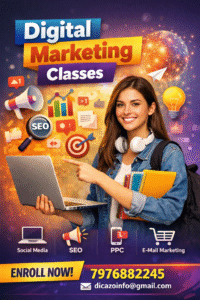The Ultimate Guide to Digital Marketing: Trends, Strategies, and Future Opportunities”
In today’s interconnected world, everyone is turning to digital marketing to reach their target audience and drive growth. But what exactly the term digital marketing mean?
What is Digital Marketing?
Digital marketing refers to the promotion of products, services, or brands through various online platforms and digital channels. Unlike traditional marketing, which uses mediums such as TV, radio, and print, digital marketing leverages the internet, social media, email, search engines, and mobile apps to reach a global audience. Its importance has grown exponentially due to the increase in internet users and the evolution of technology. Whether it’s through content marketing, social media marketing, businesses can now connect with their target audience more effectively and measure their success in real-time. It involves using digital tools and techniques to reach and engage with target audiences, drive traffic, generate leads, and ultimately, convert customers. Digital marketing encompasses various disciplines, including:
– Search Engine Optimization (SEO)
– Pay-Per-Click (PPC) Advertising
– Social Media Marketing
– Content Marketing
– Email Marketing
– Mobile Marketing
– Analytics and Reporting
The Future of Digital Marketing: Trends and Predictions
In today’s fast-paced digital landscape, staying ahead of the curve is crucial for businesses to thrive. As technology continues to evolve, digital marketing strategies must adapt to meet the changing needs of consumers. Here are some key trends that are shaping the future of digital marketing:
Artificial Intelligence and Automation
AI is revolutionizing digital marketing by offering data-driven insights, personalized recommendations, and chatbots that enhance customer experience. Businesses can use AI to automate repetitive tasks such as email marketing and social media management, freeing up time for strategic decision-making.
Voice Search Optimization
With the rise of smart speakers and voice-activated devices like Amazon Alexa and Google Home, optimizing for voice search is critical. Marketers need to adapt their SEO strategies to cater to voice queries, which are often more conversational in nature.
Video Content and Live Streaming
Video content continues to dominate the digital landscape, with platforms like YouTube, TikTok, and Instagram Live seeing explosive growth. Live streaming, in particular, offers brands a real-time way to connect with their audience, build engagement, and create authentic interactions.
Privacy and Data Protection
With stricter regulations like GDPR(General Data Protection Regulation) and the growing concern for data privacy, marketers will need to focus on building trust through transparent data collection practices and personalized, consent-based marketing campaigns.
Building a Strong Online Presence: A Step-by-Step Guide
In today’s digital age, a strong online presence is essential for business success. Here’s a step-by-step guide to help you establish and grow your brand online:
Define your goals and identify your target audience and create buyer personas :
What do you want to achieve with your online presence? Are you looking to increase brand awareness, generate leads, or drive sales? Who are you trying to reach? Understanding your target audience is essential for creating effective content and campaigns.
Develop a responsive, mobile-friendly and professional website:
Your website is the cornerstone of your online presence. Ensure it is user-friendly, mobile-responsive, and optimized for SEO. Incorporate a blog to regularly update content and boost your search engine rankings.
Leverage Social Media Platforms to engage and build brand awareness:
Identify where your target audience spends the most time and focus on building an active presence on those platforms. Whether it’s Instagram for visually-driven content or LinkedIn for B2B marketing, each social network has its unique strengths.
Craft compelling content that resonates with your audience:
Content marketing plays a vital role in establishing authority and driving engagement. Create a mix of blog posts, info graphics, videos, and webinars that provide value to your audience and align with your business goals.
Implement SEO best practices:
Search engine optimization (SEO) is critical for driving organic traffic to your website. Focus on keyword research, optimizing on-page content, and building back-links to improve your site’s search engine rankings.
Engage through Email Marketing:
Building an email list allows you to communicate directly with your audience. Offer incentives such as free ebooks or exclusive discounts to encourage sign-ups, and send targeted emails that address the needs of different customer segments.
Measuring Your Digital Marketing Success: Key Metrics
Tracking your digital marketing efforts is essential to understand what’s working and where improvements can be made. Here are some key metrics to measure your success:
Website Traffic and Engagement(time on site, bounce rate):
Use tools like Google Analytics to track the number of visitors to your website, as well as where they are coming from. Look for patterns in direct, organic, referral, and social traffic. The bounce rate reflects the percentage of visitors who leave your site without interacting with any content. A high bounce rate could suggest that your website isn’t engaging or that your target audience isn’t finding what they’re looking for.
Conversion Rate(leads, sales, sign-ups):
The conversion rate tells you the percentage of visitors who take a desired action, whether it’s making a purchase, signing up for a newsletter, or downloading a guide. High conversion rates indicate that your content and user experience are effectively driving desired outcomes.
Social Media Metrics (followers, engagement rate):
On social media, monitor likes, shares, comments, and follows to gauge how well your content resonates with your audience. High engagement rates are a strong indicator that your brand is building a community online.
Return on Investment (ROI) and Return on Ad Spend (ROAS):
Calculate the ROI and ROAS of your digital marketing campaigns by comparing the revenue generated from your marketing efforts to the costs. This helps you determine whether your campaigns are financially viable and where adjustments may be needed.
Leveraging AI in Digital Marketing: Opportunities and Challenges
Artificial Intelligence (AI) is transforming the way businesses approach digital marketing. Here are some opportunities and challenges AI presents:
Opportunities:
Personalized Content and User Experiences :
AI allows businesses to deliver personalized content and recommendations by analyzing user behavior. With machine learning algorithms, marketers can predict what customers want, enhancing customer satisfaction and increasing conversions.
Efficient Customer Service with Chatbots :
AI-powered chatbots can handle customer inquiries 24/7, providing instant responses and freeing up human agents for more complex tasks. This improves customer service while reducing operational costs.
Predictive Analytics for Campaign Optimization :
AI can analyze vast amounts of data to forecast trends, allowing marketers to optimize campaigns based on real-time insights. This leads to more effective targeting and better use of marketing budgets.
Challenges:
Data Privacy Concerns:
With AI-driven personalization comes the challenge of data security. Marketers must ensure that they are compliant with privacy laws and handle customer data responsibly to avoid breaches and build trust.
Lack of Human Touch AI-Driven Interactions:
While AI can streamline processes, there’s a risk of losing the personal connection with customers. It’s important to balance automation with human interactions, especially in customer service and relationship-building efforts.
Effective Email Marketing Strategies for Lead Generation
Email marketing remains one of the most powerful tools for generating leads and nurturing customer relationships. Here are some strategies to boost your email marketing efforts:
Segment Your Audience:
Divide your email list into segments based on user behavior, demographics, or interests. This allows you to send targeted emails that are more relevant to each group, increasing the likelihood of engagement.
Craft Compelling Subject Lines:
Your subject line is the first thing recipients see, so make it count. Keep it short, intriguing, and relevant to the content of the email. Personalization, such as using the recipient’s name, can also increase open rates.
Provide Value in Every Email:
Whether it’s exclusive discounts, insightful tips, or links to useful blog posts, make sure your emails offer something valuable to your audience. Consistently delivering value keeps subscribers engaged and reduces unsubscribe rates.
Use A/B Testing Continuous Optimization:
Experiment with different subject lines, email formats, and call-to-actions (CTAs) through A/B testing. This helps you identify what resonates best with your audience and optimize your campaigns for maximum effectiveness.
Include Clear CTAs:
Every email should have a clear and compelling CTA that guides the reader toward the next step, whether it’s visiting your website, making a purchase, or signing up for an event.
Conclusion
Digital marketing is an ever-evolving field that offers businesses the tools and strategies to succeed in a competitive online environment. From building a strong online presence to leveraging AI and email marketing, there are countless opportunities to grow your brand and engage with your audience. Staying informed about the latest trends and continuously optimizing your strategies are key to ensuring long-term success in the digital space.
Career Opportunities After Digital Marketing Course
- Digital Marketing Specialist
- SEO Specialist
- Social Media Manager
- PPC Specialist
- Content Marketing Manager
- Email Marketing Specialist
FAQs Related To Digital Marketing Course
The duration of a digital marketing course in Jaipur varies depending on the institute and the course curriculum. Typically, a digital marketing course can last anywhere from 3 months to 1 year.
No, it is not necessary to have a background in marketing to enroll in a digital marketing course. These courses are designed for beginners as well as professionals looking to upskill in the field of digital marketing.
To choose the best digital marketing course for your career goals, consider factors such as the course curriculum, faculty expertise, industry connections, and job placement assistance offered by the institute. Research and compare different courses to make an informed decision.
Digital Marketing Course fees depends on the curriculam from basic to advanced. Which is around Rs. 10,000 to Rs. 50,000/-




